As co-owner and manager of a bar, I see it as my responsibility to consider how to work more ecologically in the bar landscape. Not an easy task when you look at the international range of products used in any good bakery bar.
Especially the fresh products like the citrus fruits, which are processed in large quantities every day, often come from far away. Many fruits are imported from Sicily, from neighbouring Italy. Geographically, the large citrus plantations of Spain are even further away. Other citrus fruits even make the long journey across the ocean and are imported from Chile or Brazil.
There have always been wonderful, tasty alternatives to citrus fruits that can be used to add acidity to a cocktail.
Moreover, due to society's increasing health consciousness, more and more restaurateurs are opting for untreated varieties, which are even more difficult to obtain and also almost twice as expensive in price as untreated products. Considering all these aspects, I asked myself the question: can you run a bar entirely without citrus fruits?
There are many different opinions on this. I have come to the conclusion: Yes, it is possible!
Numerous alternatives for lemons
There have always been wonderful, tasty alternatives to citrus fruits with which you can bring acidity into a cocktail. It's just that you've never really noticed them. There is verjus, for example. The "green juice" is extracted from unripe grapes and has been used for several thousand years in the kitchen as a seasoning and in medicine as a digestive aid.
Have you ever tried sweet and sour balsamic vinegar or the juice of a Granny Smith apple? In my opinion, there is almost no more digestible acid than that of the green apple, which made its appearance in the culinary world as early as 1868.
My favourite citrus substitute, however, is what Dave Arnold affectionately calls "champagne acid". An acid mixture of tartaric acid and lactic acid mixed with water. Crystal clear, as acidic as a lemon and, above all, always the same pH value. This means that the cocktail can always be mixed with the same taste and, above all, the same acidity.

Now there is actually only one challenge left in the whole thing. The habits of the guest. How can I make the whole thing palatable to the guest? After all, it is a big change for the cocktail connoisseur when suddenly all "sour drinks" come unclouded.
So it's up to the bartender to convince his guests. A very difficult undertaking - I speak from my own experience. Some have already proven that it works. Ryan Chetiyawardana's former award-winning bar "White Lyan", for example, made exactly this its concept and was very successful with it.
I'm curious to see who else will venture onto the still somewhat thin ice. We are in.
Alternatives for citrus fruits
Instead of using the juice of lemons or limes, there are several ways to give your cocktail more acidity:
Champagne Acid: You can make the acid substitute Champagne Acid yourself. Mix 3 grams of lactic acid, 3 grams of tartaric acid and 94 grams of cold water.
Verjus: Verjus is a natural acid substitute that is not only used in the kitchen. Verjus is available in specialised shops. We recommend Meilener Verjus (Schwarzenbach Weinbau) or Bourgoin Verjus (Gaston & Suzette).




